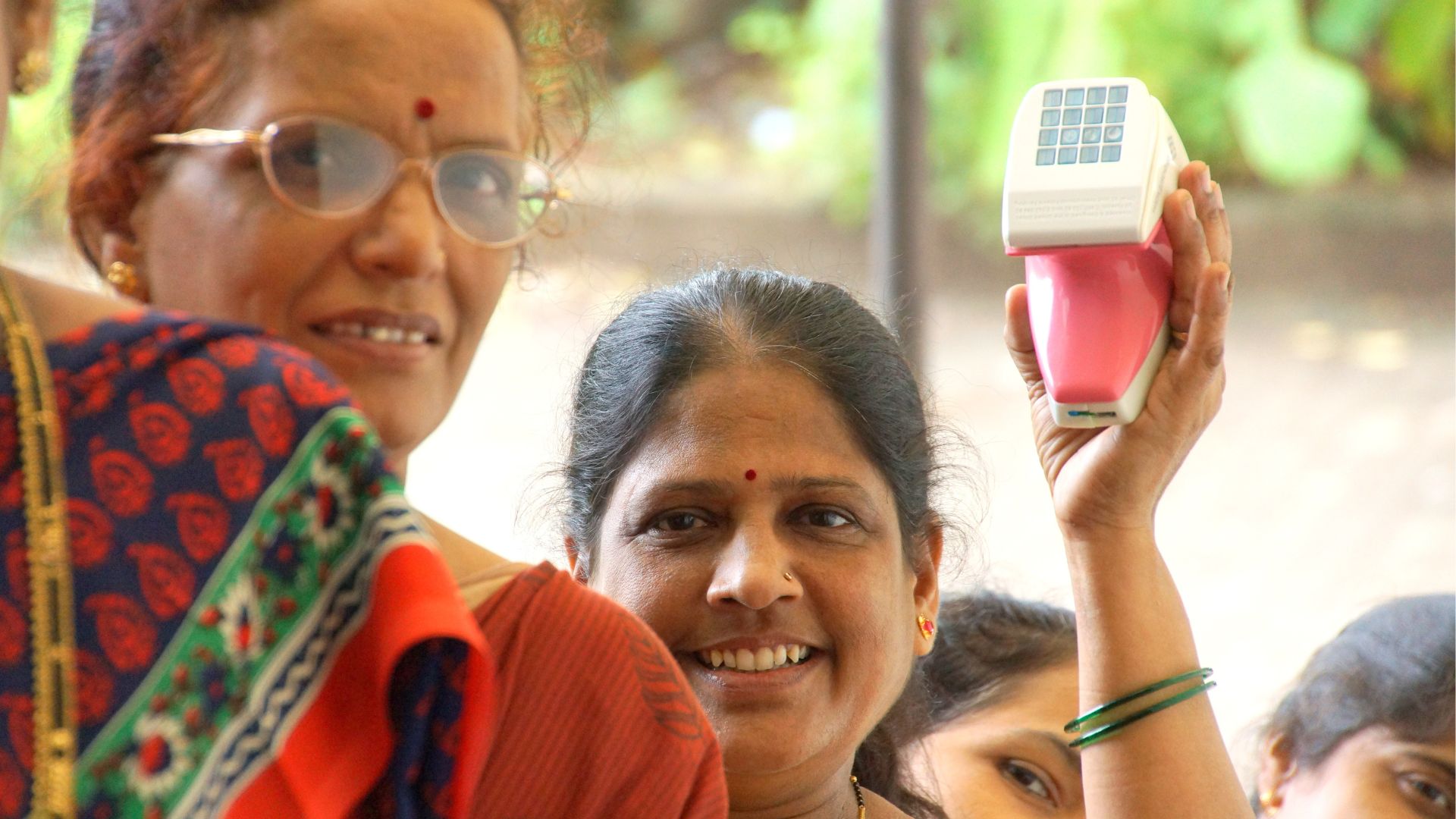iBreastExam, developed by Indo-U.S. teams, helps make early detection of breast cancer accessible, affordable and painless.
March 2020

iBreastExam is a wireless, handheld device for early detection of breast cancer. Courtesy UE LifeSciences
In India, breast cancer is the most common cancer among women, accounting for about 28 percent of new cancer cases in females in 2018, according to the World Health Organization. The mortality rate for the disease is much higher in India than in many other countries due, in part, to a lack of awareness and education.
Other common barriers to breast cancer treatment and services include the feeling of shame, religious beliefs and inequalities of gender and income. Some women in India wait to seek treatment or decline it altogether. But early detection can be key in preventing breast cancer’s growth. A device developed by teams from the United States and India might hold the key to improving the situation.
“While breast cancer is the most common cancer among women globally, most cases are diagnosed late, with poor prognosis,” says Mihir Shah, founder and chief executive officer of UE LifeSciences. The company, with offices in Philadelphia, Mumbai, Bengaluru, New Delhi and Kuala Lumpur, works on innovations in the field of early detection of breast cancer. Its ultra-portable, wireless, handheld iBreastExam device has helped thousands of women around the world receive crucial information about their health. The device’s transportability and affordability are critical because survival rates are closely tied to geography, as women in rural areas may not be able to travel to a city to receive a traditional mammogram.
“With basic training, this wireless, battery-powered device enables health workers to detect small lumps in the breast without any pain or radiation, in just a few minutes and at a fraction of the cost of a mammogram,” says Shah. “By providing women access to early detection, we can hope to save many lives otherwise being lost to a treatable cancer.”
Feedback received from both patients and health care professionals has been very positive so far. The company has also conducted multiple international clinical studies, with over 7,500 women enrolled.
Shah describes iBreastExam, which provides digital documentation, as a “comfortable, affordable solution; one that doesn’t scare women,” because it is painless and radiation-free. It is an option for those who might be put off by a traditional mammogram.

Health care workers can operate the iBreastExam device with basic training. Courtesy UE LifeSciences
At the 2017 Global Entrepreneurship Summit in Hyderabad, iBreastExam was selected by NITI Aayog from hundreds of innovations to make a presentation to Prime Minister Narendra Modi and First Daughter and Adviser to the U.S. President Ivanka Trump. “iBreastExam was offered a special feature spotlight, and it was a great experience for us all.”
The product was developed as a collaboration between teams in the United States and India. “iBreastExam is an Indo-U.S. innovation, with its roots in the United States and scale up in India,” says Shah. “We kickstarted the development with Pennsylvania Department of Health’s CURE [Commonwealth Universal Research Enhancement] grant of nearly $1 million, followed by a Digital Health Accelerator grant from the University City Science Center. Once we had a functional prototype, we transferred the technology to India for clinical validation and production.” The patented tactile sensor technology was invented by the scientists and doctors at Drexel University, Philadelphia. “It was only with this Indo-U.S. team and a whole host of multidisciplinary collaborators that we were able to bring it to scale,” adds Shah.
Many women who learned through the device that they had breast cancer have reached out to the company after receiving treatment, to share their appreciation.
“They want to thank us for saving their life when, in fact, we want to thank them for having the courage to get checked early and taking action promptly,” says Shah. “Early detection of breast cancer starts with a woman’s conviction that breast cancer is not a death sentence.”
Shah and his company have big plans for the future, including a goal to reach 200 million women across India and over one billion women globally. “We’d like iBreastExam to become more and more accessible to women across India,” he says. “We hope to collaborate with governmental bodies, corporate social responsibility offices, nongovernmental organizations and private health care providers to make this possible. To date, we have done over one million scans. We hope more people, doctors and health care policy makers take notice of this innovation and put it to good use to make the promise of early detection a reality.”
Candice Yacono is a magazine and newspaper writer based in southern California.
COMMENTS